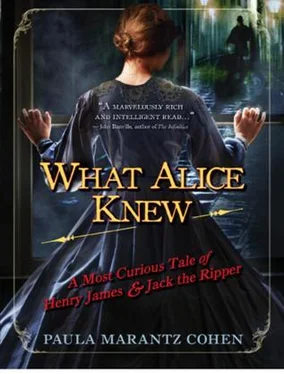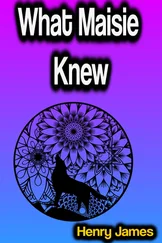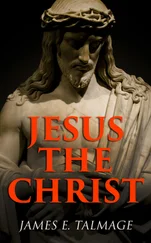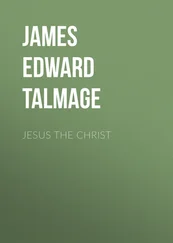“My name is William James,” William clarified further. “I’m a professor of philosophy visiting from America.”
The man’s face cleared at once. As if thinking on the subject, he commented lightly, “‘Replace religion with philosophy,’ Ben says, ‘and the world will be a better place.’ That’s rubbish if you ask me. But it’s his soul, and yours too, for that matter. You’ll find him at the pub round the corner at one of his meetings.”
William nodded, wondering why the man had changed in his manner so abruptly, and turned the corner. The pub was indeed just a few yards down, although he would not have known it was there without being told. The sign hanging from the door was so ingrained with dirt as to be unreadable, and the establishment itself was located not on the ground level, which was occupied by some sort of pitiful shop—most of the merchandise of which seemed to consist of torn clothes and broken crockery—but at the bottom of a rickety set of steps in an area that resembled a dank cave. As he entered, William saw that a group of young men were seated toward the back, and that as soon as they saw him, they rose quickly and ducked out the door directly behind them. It was obviously a political gathering, possibly an anarchist cell that was plotting an act of defiance, if not outright destructiveness with regard to their society. He was again struck by the possibility that Cohen could have political reasons for having committed the murders, as Henry had originally suggested with his talk of cabals and Masonic societies.
Cohen remained at the table after the others dispersed, though, and rose with an expression of excitement on his face. “Professor James,” he said, his eyes bright. William noted what he had not noted at the police station, that the man was extremely thin and looked malnourished.
“You know my name?” asked William in wonderment. He recalled that the vigilante had also responded with immediate deference to his name.
“I might have recognized you from the photograph in some of your books,” Cohen explained, “but I had the additional help of seeing you at police headquarters this afternoon.”
When William looked puzzled, he continued. “There are members of our faith even on the London police force, and so news of your defense of me following my arrest came through those channels. I’ve admired your work for years. To have you to thank for intervening on my behalf makes me almost believe in God.”
As he spoke, he had taken William’s arm in an appropriating gesture and led him, without commentary, out of the pub. A kind of nervous energy emanated from the man, which William found at once endearing and unnerving. With Cohen’s hand on his arm, the two men walked briskly around the corner until he came to the closed shop that he had surveyed earlier. Cohen took a key out of his pocket, unlocked the padlock, and motioned for William to follow him inside. The shop had indeed been stripped bare.
“You are leaving your business?” asked William.
“I have decided it is no longer worth trying to effect social change in this country,” said Cohen, waving a nervous hand at his ramshackle surroundings. “I am going east to abet the Revolution.”
There was a note of repressed hysteria in the man’s voice, and William wondered again if he were an unstable and possibly dangerous personality.
Cohen had by then opened a door at the back of the shop that led into a space hardly bigger than a closet. There were no windows; in the corner was a cracked washbasin and a small cot covered with a ragged blanket. The room would have been cramped and airless under any circumstances, but what made it more so was that every spare inch was piled with books. These were the remains of Cohen’s trade, books he had not been able to sell or with which he was not willing to part.
As the two men moved as best they could into the room, Cohen suddenly grabbed a volume at the top of one of the piles. “You must be familiar with the ideas of the German philosopher Marx,” he exclaimed, waving the book excitedly. “He exposes the oppression of church and family and calls for the transfer of economic control to the people.” He pressed the book into William’s hands. “Read his Capital , and you will be converted. You are a utopian, Professor James, though you may not know it.” He paused as if to scour his memory and then recited, “‘This universe will never be completely good as long as one being is unhappy, as long as one poor cockroach suffers the pangs of unrequited love.’ It’s from one of your essays.”
William laughed, surprised. “I had no idea I had a disciple who could quote me on the subject of cockroaches,” he noted uneasily, “but I fear you distort my ideas. I believe in social justice, but my political views are moderate—”
“But you haven’t given it enough thought,” Cohen interrupted impatiently. “As an American, you are removed from the kinds of misery that people like myself see on a regular basis.”
William nodded; there seemed to be no point arguing with Cohen. Passionate belief—whether religious or political—was a form of lunacy. One stayed sane by keeping passion in check and by refusing to feel too much about anything. He understood the trade-off; he had made it years earlier.
Cohen waited for William to put the copy of Capital into the breast pocket of his coat and then reached under his bed to retrieve another book, obviously placed there for safekeeping. “I was hoping you would come, not just so I could discuss philosophy with someone whose work I respect, but also to give you this.” He passed the book to William. “I believe it may be evidence in the case for which I was arrested, though what it means I have not been able to decipher.”
William looked at the cover, which was printed in embossed gold lettering, The Complete Writings of Thomas De Quincey, Volume Four . He glanced up inquiringly.
“It was from the pages of this book that the police extracted the photograph of the murdered woman in that unseemly pose,” Cohen explained. “They had already found enough Marx and Fourier to indict me as a syndicalist and revolutionary. The photograph was an added bonus. I would have assumed they planted it, had I not seen with my own eyes one of the officers find it in this volume. At first, they simply took it as evidence of my degeneracy, after they’d ogled it themselves, of course. I don’t think the connection to the Ripper victim would have been made at all if someone at headquarters hadn’t seen it. By then, no one remembered the book in which it was found.”
William opened the De Quincey volume.
“Notice the first essay,” prompted Cohen, as William turned to the Contents page.
“‘Murder Considered as a Fine Art,’” recited William.
“A suggestive piece of writing in which to place a photograph of a murder victim, don’t you think?”
William nodded. He knew the essay—it had appeared some fifty years earlier in the popular literary magazine Blackwood’s and had circulated widely since. He recalled that he had once praised its cleverness in a conversation with his father, who had responded with surprising vehemence. “It’s easy to make clever claims for degeneracy,” Henry Sr. had said, “but it takes a deeper talent to show why evil must be strenuously countered by the force of good. An argument like De Quincey’s gives no counterforce to evil and therefore shares in the degeneracy it mocks.”
The validity of his father’s position now struck William with particular force. De Quincey’s argument fit with Alice’s theory that the murderer was a perverted sort of artist.
“Look through the article itself,” instructed Cohen.
William flipped through the pages and stopped where a line had been lightly underlined in pencil. “‘…as to old women, and the mob of newspaper readers, they are pleased with anything, provided it is bloody enough. But the mind of sensibility requires something more.’”
Читать дальше












